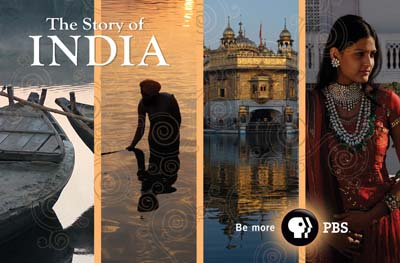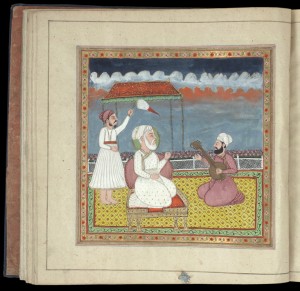
Co-blogged by Phulkari and Sundari
 Perhaps like many of you, last night was spent watching The Story of India – a BBC series being aired on PBS. The six-part series (which our UK langarites may have already seen as it was aired in the UK in 2007) is narrated by historian Michael Wood and covers 4,500 years of the subcontinent’s rich history.
Perhaps like many of you, last night was spent watching The Story of India – a BBC series being aired on PBS. The six-part series (which our UK langarites may have already seen as it was aired in the UK in 2007) is narrated by historian Michael Wood and covers 4,500 years of the subcontinent’s rich history.
The first two episodes aired last night. Episode One, aptly titled Beginnings, takes us on a journey through India, tracing the incredible richness and diversity of its people, cultures and landscapes. Through ancient manuscripts and oral tales the documentary charts the first human migrations out of Africa.
In Tamil Nadu the latest DNA research takes him to a village where everyone still bears the genetic imprint of those first “beachcombing incomers”-the “first Indians” who went on to populate the rest of the world excluding Africa. [link]
As Wood aptly says, “Mother India indeed”.
Today is World AIDS Day. The theme of this year’s World AIDS Day is leadership and efforts are focused on prevention. Indeed, on this 20th anniversary of World AIDS Day, President-elect Obama has stated that his administration will focus on prevention and treatment for at-risk communities in the U.S. and rest of the world. World AIDS Day, is the day when organisations from around the world come together to bring attention to the global AIDS epidemic. In 2007, there were 33 million people living with HIV/AIDS. Women account for 50% of all adults living with HIV worldwide and young people (under 25 years old) account for half of all new HIV infections worldwide.

In line with the theme of leadership which is the message of this year’s anniversary, I came across AIDS Jagoo – an effort by Mira Nair and the Bill and Melinda Gates Foundation – to bring together Indian directors and actors to create four short dramatic films that aim to “dismantle myths and misconceptions of HIV/AIDS.” The four AIDS Jagoo films come from various parts of India – each its own genre and with a different point of view on the HIV/AIDS epidemic.
Migration, directed by Mira Nair, discusses HIV/AIDS from an urban/rural angle. Blood Brothers, directed by Vishal Bhardwaj, follows the journey of a young man from a positive HIV diagnosis to the eye-opening conclusion. Prarambha (The Beginning), directed by Santosh Sivan, deals with society’s prejudices against people with AIDS through the journey of a young boy’s search for his mother. Positive, directed by Farhan Akhtar, shows a family coping with AIDS and reveals the courage they bring to overcome the tragedy. Most of the films have subtitles. Hopefully you’ll be able to watch some or all of these and join the global community in remembering those impacted by HIV/AIDS.
I spent the past weekend surrounded by Sikh Art and Film at the annual Spinning Wheel Film Festival in Hollywood. I usually attend these events with high expectations, hoping to be inspired and moved and there are always one or two films that provide that sustenance. The films were creative, such as The Making of Liverpool – an artistic animation inspired by a painting by The Singh Twins which explores 800 years of Liverpool’s history. The films were educational, such as Cultural Safari – directed by Sandeep Singh and produced by the Kaur Foundation – describing the basics of Sikhi for children of all ages [I have to say that this is one of the most impressive educational films I have come across]. The films were also daunting, such as Warrior Boyz – made by Baljit Sangra which touched upon the root causes of gang violence in the Punjabi community of Vancouver. A favorite of the crowd was Kuldip Powar’s Unravelling – a poetic inter-generational dialogue between the film director and his grandfather about the experience of war all posed in Urdu poetry.
 There were many other well-made films such as 35, Kabaddi Cops, and Right to Turban which rightfully deserve mention (and have been discussed or will be discussed in future posts), however what I appreciated most about the weekend was the final day of the festival – which was devoted to lectures on Sikh Art and History. Staff from the Anglo Sikh Heritage Trail and other UK-based organizations presented the attendees with a glimpse into the historical legacy of the Sikhs. One of the lectures was titled the Epic of Saragarhi and discussed the 21 soldiers of the Sikh regiment who defended a remote post against an estimated 10,000 hostile tribesmen. Michael O’Keefe from the British Library discussed Sikh artifacts and paintings and detailed an image of Maharani Jindan Kaur’s Gutka of the Sukhmani Sahib (see picture to the left). The day ended with a panel showcasing Sikhs in Theatre and Music, including traditional music and also hip-hop. Mandeep Sethi and Jagmeet Singh, rappers from LA, ended the festival with amazing performances showcasing their incredible talent of telling stories through hip-hop.
There were many other well-made films such as 35, Kabaddi Cops, and Right to Turban which rightfully deserve mention (and have been discussed or will be discussed in future posts), however what I appreciated most about the weekend was the final day of the festival – which was devoted to lectures on Sikh Art and History. Staff from the Anglo Sikh Heritage Trail and other UK-based organizations presented the attendees with a glimpse into the historical legacy of the Sikhs. One of the lectures was titled the Epic of Saragarhi and discussed the 21 soldiers of the Sikh regiment who defended a remote post against an estimated 10,000 hostile tribesmen. Michael O’Keefe from the British Library discussed Sikh artifacts and paintings and detailed an image of Maharani Jindan Kaur’s Gutka of the Sukhmani Sahib (see picture to the left). The day ended with a panel showcasing Sikhs in Theatre and Music, including traditional music and also hip-hop. Mandeep Sethi and Jagmeet Singh, rappers from LA, ended the festival with amazing performances showcasing their incredible talent of telling stories through hip-hop.
While the film festival brought together a plethora of Sikh art mediums – what it did seem to be missing was the representation of women and the voice of women in these films. The films were predominately made by men and the issues discussed were predominately issues affecting men. This brought several issues to mind – do young Sikh women not feel encouraged to enter the field of Film? Do the current male Sikh filmmakers not feel comfortable telling the story of Sikh women? It seems to be of vital importance that as we develop and promote Sikh films, we ensure that the stories we tell are representative of the entire Sikh panth and pay particular attention to the stories of Sikh women.
I will leave with this quote, mentioned by Harbinder Singh of the Anglo Sikh Heritage Trail, but also very pertinent to the theme of this weekend’s film festival.
Until lions tell their own history,
History will always glorify the hunters.
– African Proverb
